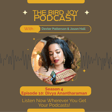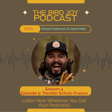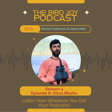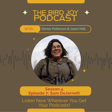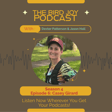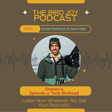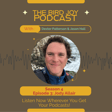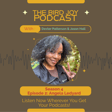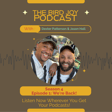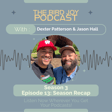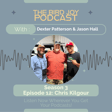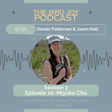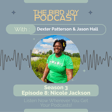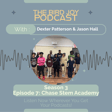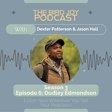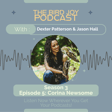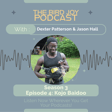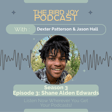Become a Creator today!Start creating today - Share your story with the world!
Start for free
00:00:00
00:00:01

The World is Your Flyway: A Conversation with George Armistead
In this globe-spanning episode, we sit down with legendary birder George Armistead. This man has guided trips on all seven continents and made it his mission to craft wild and meaningful birding adventures. We discuss the roots of his passion, the power of group travel, the behind-the-scenes magic of The Life List podcast, and how birding culture is evolving globally.
Whether you’re a backyard birder or a global chaser, this episode will leave you ready to pack your bins and hit the trail.
Guest Links
- 🐦 Hillstar Nature – Explore guided birding adventures across the globe
- 🎧 The Life List: A Birding Podcast – Smart, funny, and deeply birdy conversations
- 📚 Better Birding & ABA Field Guide to Birds of Pennsylvania – By George Armistead
Birding Club Shout-outs
Transcript
Introduction and Guest Introduction
00:00:00
Speaker
You're tuned in to season three of the Bird Joy podcast hosted by Dexter Patterson and Jason Hall. This podcast is for all the homies across the globe, a place to celebrate birds, community, and joy together.
00:00:15
Speaker
We're back with more stories from the birding world, more voices doing dope work in STEM, and more reasons to get outside and enjoy the birds. Are you ready for some bird joy? Let's go. Welcome back to the Bird Joy podcast, where we celebrate people, the passion and the memorable moments that make birding so special. We're your host, Jason Hall and Dexter Patterson. And today's guest is someone who has been living and breathing birds since the age of nine and has spent his life connecting people with the natural world.
George Armistead's Birding Journey
00:00:48
Speaker
He's guided trips on every continent, y'all. He is the co-host of the Life List of Birding podcast and is the founder of Hillstar Nature. His mission, create birding experiences that are meaningful, wild, and unforgettable.
00:01:03
Speaker
He's also the author of Better Birding and the ABA Field Guide to the Birds of Pennsylvania. Hey, hey. He is on the board of directors for the American Birding Association and a true ambassador for the birding culture.
00:01:17
Speaker
We are hyped to welcome the homie George Armistead to the Bird Joy podcast. Yes. Welcome, George. Thank you guys so much. I'm stoked to be here. Long time listener, first time guest. And yeah, I'm psyched to get my lifer Dexter virtually here. um Missed a misstic connect when you were back here in Philly a little while ago.
00:01:40
Speaker
And it's, of course, always good to be talking to Jason. love Right. Right. I can't agree more. George, it is super, super, super. It's awesome to meet you virtually. i will be back to PA so so we can connect and, you know, hopefully we can meet in a while for sure. so Yeah, that'd be good. Nothing like that. Habitat.
00:02:00
Speaker
Yeah. Yeah. Nothing like that. Nothing like that, man. So but let's just let's dive right into it. yeah You've been birding since you were a kid. What do you remember about your first memorable bird experience in and what made that stick with you at such a young age?
00:02:15
Speaker
Yeah.
Rediscovering Joy in Birding
00:02:16
Speaker
You know, ah people talk about spark birds a lot. And i like my dad is, you know, is an in a long time birder. He's 82, almost 83 now. He started in 1950. So I, you know, and my my uncle is also, you know, he's passed, but he he was super into nature, especially herps and stuff.
00:02:35
Speaker
I come by it honestly. You know, my whole family basically is super into into nature, especially birds, but really everything. And so I didn't have kind of one, you know, spark bird moment. I think this is true of a lot of people. it's sort of ah kind of a drip, drip, drip. You know, you got, you got like, this happens, this happens.
00:02:53
Speaker
I have several memories. Like I remember particularly a family trip where my dad was like, let let's pile into the Chevy Suburban. We're going to drive up into Canada. We went through the prairie potholes.
00:03:05
Speaker
I remember like seeing like a beautiful male blue winged teal. being like, wow, that's not just a duck. you know That thing thing it is looking good. And then we like got we drove up to Thompson, Manitoba, ended up taking the train all the way up to Churchill, Manitoba. So I got pretty lucky in that you know some of the first birds I remember seeing were breeding plumage Hudsonian godwitz and Smith's longspurs.
00:03:30
Speaker
Even Ross's gulls. so And Pacific loons in particular was another one that I was like, that is not a bird. Like, what is that? And then, and then back, and then like, you know, that was pretty much hooked
The Role of Mentors and Family
00:03:41
Speaker
at that point. Even prior to that, I remember doing a class trip in like, I don't know, second grade, maybe first grade to Bartram's garden here in Philly, you know, one of my favorite hotspots and just seeing two little fluffy brown creepers, you know, kind of inching their way up One of the big old trees there. I'm not sure which tree it was.
00:04:01
Speaker
In my mind, I like to think it's, you know, one of that big old ginkgo tree that was there for a couple centuries or whatever. Those were some of the first birds I really remembered. And I think like a lot of us, you start off wanting to just see more and more and more and more and and build the list out.
00:04:18
Speaker
And then it's sort of stops becoming about the list as much and more about, you know, kind of getting to know your friends better. Sure. Feathered ones. I like that. No, you know, your friends better. love that.
00:04:32
Speaker
That's right. Less about the list. Yeah. That's right. And with that neighbor vibe that started a couple of weeks ago with Danielle, love that so much. Yeah. Yeah. I wonder if your dad knew,
00:04:43
Speaker
what he was doing when he put you on that train to Manitoba. And he was like, I'm going to create one of the greatest birders in the history of mankind. you know like I wonder if he knew, like yeah, this is how I'm going to get him.
00:04:56
Speaker
Yeah. Well, that's high praise. I appreciate it. I like to say I like to bird. My field skills are decent. i you know don't even We could talk about what a good birder is. I think there's many different definitions, but sure I think yeah yeah i think um my dad, honestly, if I'm being serious, I think he just wanted to go. And he was like, I want i want to be with my kids, have this experience. And my mom was like,
00:05:20
Speaker
This will be fun, but we're going to drive each other crazy. And I remember me and my sisters, man, we were at each other's throats in that suburban. You know, we were like, we were just tearing each other apart. It seemed like for the first week or so. And then all of a sudden I started getting more interested in what was outside the van than and and what was in it.
00:05:38
Speaker
I think, you know, it took my dad like he kind of I want to say he tried to get me interested for a while and then he'd kind of given up. You know, he's like, all right, if it happens, it happens. And then it was wasn't long after that. and I started being like, hey, you know,
00:05:52
Speaker
how we how can we see a prothonotary warbler? Got it. like Yeah, exactly. Are there indigo buntings around here? Yeah. And then it was like, that's it. You know, it's done.
00:06:02
Speaker
That curiosity and being and being nurtured early, I think is awesome. I think it's funny when you say your dad just probably wanted to go and then I'm looking at Jason sitting on a birding vacation right now. Yeah. um just It just kind of, it's kind of funny, you know, it's kind of funny with how that how that works out, you know, with those things.
00:06:21
Speaker
those early mentors and if you're lucky to have people in your family that can instill that that sense of curiosity and wonder and you that's one of the strengths of a kid you know and as we get older a lot of people lose that curiosity that sense of true adventure and exploration that kids just have right like this unfettered just relentless curiosity, imagination. And I think as adults, sometimes that starts to get sucked out of us. And I think bird joy is what can keep that and allow us to tap that to tap into that inner kid. And I love that. I love that.
00:06:56
Speaker
That is something that was nurtured in you earlier. And I still see that in you today, George. Yeah. and I mean, I totally agree. I think like ah as kids, all of us start out as birders, right? Like the first words we learn often are related, maybe not to birds, but to nature, you know, tiger, giraffe, rhino, you know, like we learn animals first because they're, you know, as before we can speak, we're like, that's not like us. Like what the heck is that thing? Yeah.
00:07:22
Speaker
and And I do think all of us start out as birders. we We just don't really know it. It kind of gets socialized out of us, it feels like a lot of times. And and of course, being a teenager, you're you're I think in teenage years, particularly hard. even Even I took a, you know, despite being totally down the rabbit hole, there was like a brief time in my my late teens when I was I was kind of distracted by other things. Sure. and And I think that happens, you know, and and and for a lot of people, you know, once they get to be young adults, they got kids, they got jobs, stuff can get busy, but they can rediscover it. And I think that's what you guys have done a really great job of is especially for folks that are rediscovering it.
00:08:00
Speaker
You know, they're like they have that nature in them that they want to they want to be out in nature experiencing it.
Balancing Birding with Group Enjoyment
00:08:07
Speaker
It's just been great to to witness. this whole thing, especially post COVID, you know, it's just amazing. what You both like, that is a, that is a word we're to clip that decks because this rediscovery of curiosity and like, you gave me goosebumps when you guys were talking about it. Cause just watching my son today, you know, like he wants to go to the pool, but we're at the pool and he's like, dad, what's that buzzing noise?
00:08:29
Speaker
And I'm like, I think it's a cicada or something, but in that bush over there, And he was like, all right, well, how big is it? And I'm like, i don't know. We try to go see it. You know, it gets quiet as soon as we walk over there. And like five minutes later, as mockingbird comes in just grabs it and is beating is beating it against the ground, trying to get it. And he's like, oh my God. dad, look at that. It's like, this is like what is it doing? And just watching his curiosity, 30 seconds later, he was back to like watch me do a cannonball. But you guys gave me goosebumps because that that's exactly what we all try to do. And we never really characterize it like that as adults of like, we're trying to rediscover our curiosity, our joy. like We don't talk about it like that. And like me renting this condo here for my family, a two minute walk from a nesting bird colony on the beach, there was a reason why I did that. You know, but it's for the same reason. Right. and and And George, I'm wondering, like, you know, you've been leading field trips for birds since you were young person, teenager. Right. Is that how you were kind of shaping those early experiences as a guide? Right. Like what, like what kind of leader were you then? Were you tapped into the the rediscovery of curiosity then?
00:09:38
Speaker
Were you tapped into just getting people on birds? Like how did that kind of start, you know, for you? Yeah, it's a good question. And it's certainly there's aspects that have remained the same for me throughout, but there are certainly stuff that has changed as well. And also just birding has changed during that time. So I would say I always like to me, the number one thing thing is it should be fun.
00:10:00
Speaker
People should be having a good time. And if you're not having a good time, then You need to change something a little bit, you know, even just a little change can make a big difference. But I will say that and, and you know, initially after I ah there was sort of the initial discovery phase, then it for me, it was all about being sort of fast and good, you know, like super fast identifying stuff. And that's good exercise, I think, for for anybody is to just sort of like.
00:10:27
Speaker
you know, even pre-lifting your binoculars, it's something just like give a gut, like what does that thing move in like, what does it shape like, you know, in this situation, what could it be like? That's a good exercise. But I think there's, you know, for a while, that's kind of all I really cared about.
00:10:41
Speaker
You kind of hit diminishing returns on that. And, and there's some places you go birding where if you're leading a group and you're trying to teach people that that's not even really all that useful. You want to be able to take your time and not just be like, yeah, that thing that just zipped by that nobody basically saw. i i know what it is, but, you know, you know, you want to be able to look at something that's right in front of you, giving you time, presenting itself for you to study and soak it up. And so then developing some context around these birds, ah the natural history, you know, their behavior, their breeding biology.
00:11:14
Speaker
that becomes just richness that that you can add. and and the And the brilliant part of it, too, is that it never ends. Like you can always build on that stuff. You can relearn stuff you forgot. It's yeah, that part is just is really fun. So I think for a long time it was all about ID and quick IDs and being fast.
00:11:33
Speaker
And spotting stuff super fast. And as time goes on, I'm like, all right, like, let's let's just enjoy the downy woodpecker that's right here. Let's just enjoy the common yellow throat that's like right here looking beautiful and living its life, you know?
00:11:48
Speaker
There's different circumstances, right? There's so many different kinds of birding. I still enjoy trying to be fast and good in some situations, you know, like like pelagic birding, I often say is the hardest kind there is. You you're dealing with birds that are distant and fast and they don't give you a lot of time and they're really unfamiliar to most folks. And so you almost, you know, you have to do the best you can with what they present.
00:12:11
Speaker
It's context driven to a degree. on you know Whether I'm leading a bird walk, say, at Independence Hall or leading a pelagic trip or ah a week-long or three-week-long tour, the way that I guide changes a little bit.
00:12:24
Speaker
But overall, i I want to smell the roses and savor savor this stuff because that's the good stuff. any Any things you you think back on from your younger years, birding or leading bird tours? any I often think I have a like ah ah list of like three nightmares of things that I've misidentified in front of people that I'm never going to forget. But any any like kind of funny moments or early experiences on that you'll never forget that you appreciate now?
00:12:50
Speaker
Oh, yeah. I mean, i like I do think, I was actually just saying for our podcast the other day, was like, we should have a like ah time where we discuss our like our worst misidentifications ever. you know like You know, these birds, they humble us. you know They humble us again and again and again.
00:13:08
Speaker
i mean, i do remember... I don't know, like it it wasn't that bad a Miss ID, but it was been so uncharacteristic. But i so I had a downy woodpecker on a big day with my, it was me and my dad, a couple other friends, one or two folks.
00:13:23
Speaker
There was like one of my dad's good friends, super birder, definitely wanted to try to impress him with how good I was and ah amazing, you know, finding rarities as I could be. And I just like screamed out red cockaded woodpecker, you know, here we are in central Maryland, California. It was a few centuries ago or a few decades ago. They actually did breed there.
00:13:43
Speaker
But man, I screamed it out with full confidence. You said it with your chest. Yeah, exactly. i I was definitely like, I was so excited and I just couldn't have been more wrong. And it had also, it wasn't like I got to correct myself.
00:13:56
Speaker
I had to be people like, no, I really think you're just kind of getting this one wrong, George. and ah And that always makes a little more painful. You know, if you make a really flub one, then and you are the first to correct yourself, you're like, that's not quite so bad. but yeah But in this case. Others have to tell you sometimes, yeah.
00:14:13
Speaker
Yeah. And there's ah there's a you know there's definitely an art to do it, right? We're learning that now in 2025, those those arts to not taking ourselves so seriously, but when we are going try and help somebody get an ID right, like there's a nice way to do it. And I and i think that's ah it's a thing I'm seeing more often now is people trying to take the time to do it. You do it in front of your dad.
00:14:33
Speaker
i'm sure I'm sure Mr. Armistead had to pull you back and be like, listen here, son. He was like, reeled me right back in. He was like, no, no, no, no. Yeah, yeah, yeah. You know, always say if if if a birder around you isn't willing to be humbled,
00:14:47
Speaker
Those are the worst kind of birders. Yeah. Right. Like those type of people were just, they're always right. No matter what, like, I don't want a bird with you. I'm sorry. They're going to get embarrassed eventually too. It's going to be them that gets embarrassed, but they just refuse to admit it. you know Yeah. Yeah.
00:15:03
Speaker
Yeah. It's ridiculous. George, you've traveled all over seven continents.
Unique Birding Destinations
00:15:09
Speaker
Of all the places you've been, which destinations continue to take your breath away and why?
00:15:14
Speaker
Good question. i would And honestly, we were just talking right before the recording about this Tanzania trip Jason and I were lucky to do a couple years ago. Again, the group ah that we had, I think, really helped make the experience.
00:15:26
Speaker
But It's one of those places where it's one of the few destinations, one of the few tours I do that from start to finish, you're basically in birding habitat, wildlife the whole time. You know, so many trips, you're like, okay, birding mode now.
00:15:43
Speaker
All right, now we're in travel mode. we need to like We need to move, we need to cover ground. And during that time, you know it might you might be going through eucalyptus you know forest or you know stuff that where you you know other ag situations or urban situations where you're really not going to see much of interest anyway. That trip, you land right next to Kilimanjaro. There's...
00:16:02
Speaker
You know, there's definitely some ag all around there, but there's farm fields. And before you know it, you're you're just sort of tooling through these three more or less contiguous national parks, Serengeti and Gorogoro Crater, Terengire. And once you enter Terengire, you know, you're you're really, there's very little time when you're not in areas where there can be big animals. And and throughout the entire route, you can be picking up new birds the whole time.
00:16:27
Speaker
So I really love that trip. It's in a lot of people's mind. It's almost... I call it the ultimate safari, which I i really believe it is. I think in a lot of people's mind, it's like almost so classic that it it will get dismissed eventually. Man, to me, that's that's as as exciting a trip as as there is. And like so you've been to so many amazing places. Like, how do you kind of balance this like chasing of lifers and seeing new stuff with making sure that you're creating that group magic? Like, how do you find that balance? I actually do very little chasing period.
00:16:59
Speaker
And it's not like I have, I have historically, I've done a lot of it, of course, but on most of our tours, you know, we're, what's kind of fun about the trips is that you're really going to see the stuff that's supposed to be there.
00:17:12
Speaker
Been on a few trips where you find something really out of place and you're like, okay, well, that's cool. That's like, You know, it might be a first country record or one of a few, but it's really not what we came here for.
00:17:22
Speaker
And so, but there are birds that are sort of chases in that part of the reason you go on these trips are you have very specific birds in mind. Like there's certain iconic birds, like it'd be tough to go to Tanzania and not see a secretary bird. you know which is kind of one of the real iconic birds of the endless plains of the Serengeti and surrounding it i mean, it's fairly widespread throughout sub-Saharan Africa, but still, i think of that it was I think it's been voted the favorite bird on our trip multiple times. Yeah.
00:17:52
Speaker
And it makes sense. reason Eyelashes, man. They get you. That's right. That's right. You know how to bat those eyelashes. Yeah. But and when I'm home, you know, like sort of local birding, it's pretty rare. i chase stuff but maybe once a year. i went hard for the flamingo, flamingos that showed up in PA. a So did Dexter in Wisconsin. Yeah. Nice.
00:18:14
Speaker
That's why I always tell them, there are very few birds that I chase, I'll like, oh, I'll see sometime, right? But if it's something that I'm like, this probably won't happen again. man, when he texted me, I was like, oh man. yeah And it was an hour away. like To me, I'm like, that ain't even chasing. That's just like driving to Milwaukee. That's not normal.
00:18:36
Speaker
That's a normal birding trip for me. you know so Yeah. Like one thing I'm going to have to do when we drop this episode is, is dub in a picture of George's outfit. When he saw those flamingos, it was a, it was bright pink flamingo pattern. don't know if we call it a romper or a jumpsuit, but it was, it was intense. It was, it was on point. it was probably the best outfit that showed up to see the flamingos.
00:18:59
Speaker
um um i got say i was I was pretty proud of it. and And like we were out the door and I was like, wait a minute. I got I know what to wear. And I was like, and my legs hadn't seen the sun all summer. i was so chalky and like I had like sugar bites all over my legs. It was like these white legs with these like red spots everywhere with this. Oh, man. It was. It was a look. It really was. That's awesome.
Hillstar Nature's Philosophy
00:19:22
Speaker
So you are the founder of Hillstar Nature. Incredible. this This is the group we went to Tanzania with. You assembled the trusted team of guides and you guys offer trips all over the planet, like everywhere.
00:19:36
Speaker
What makes a tour with Hillstar Nature different than what you think other companies may offer? Good question. i never know quite how to answer it because I think mostly it relates to us and our core team. And there's a lot of good companies in this business.
00:19:53
Speaker
You know, there there really are. in In fact, I just did the Alaska trip, which is one of our our sort of tried and true trips. And what always amazes me is it's Alaska is one of the few trips, you know, everybody goes in June. So you're overlapping with every group and everybody shares.
00:20:09
Speaker
You know, everybody really shares information. It's one of the I have to think it's unusual within industry that competitors are so freely sharing information and and so enthusiastically.
00:20:23
Speaker
But I think. With us, it's it's sort of the ethos of, okay, we we're going to keep eBird lists on pretty much all our trips. you know we We want to do that.
00:20:35
Speaker
The list is not purely the the driver of the itinerary or the trip. Really, I like to think of us more as kind of biogeographers. um We were coming to see this region because of the unique aspects of this region, because the unique birds, characteristic and iconic birds and animals.
00:20:56
Speaker
We definitely break for whales and big mammals. And that's part of the experience. The food is a big part of the experience, if if possible. Some trips, there's not much you can do about the food.
00:21:07
Speaker
But a lot of the time, you know, you can eat pretty well. And usually, you know, we try to stay in fun places. And I'd say as much as anything, we always are trying to have partners on the ground in these foreign trips that we do where we feel like when you go home, you feel like you've met somebody, you know somebody. Maybe you've met, so you have a community a little bit.
00:21:27
Speaker
where you got a toehold, say you end up back there, you know you know who to call. You need a restaurant recommendation when you're in Bogota. You i'll you know, I'll reach out to you know our friends here that helped us on the trip.
00:21:38
Speaker
And so that try to try to build those bridges. And what we do and not just Hilster Nature, but other companies, too. But I think well one of the things that people don't think about necessarily is how important the trips are for the local businesses, for the local restaurants, local hotels, for the local guides, for local park rangers.
00:22:01
Speaker
Our trips have a big impact on a lot of these those businesses there. And those are often the businesses that are involved in the conservation sector. You know, those are the ones that that's where the rubber meets the road for helping to preserve these birds. So I would say it's it's our core group, you know, which is me, Molly, Josh Coville, Phil Sean, Holly Merker and others. Jason, too.
00:22:23
Speaker
I mean, I think what part of what we try to do is you know build bridges to other countries, emphasize the biogeography geography of an area. Yeah, sure. We want a nice, pretty list at the end, but we're not necessarily going to drive an extra two hours to add an extra three species wearing people out.
00:22:40
Speaker
We'd rather be sitting around a nice meal with maybe a nice bottle of wine or a local beer or whatever, or just some nice food. You know, um i think those are the things we emphasize and and try to distinguish ourself that way.
00:22:55
Speaker
community community and memories. Yeah. That's beautiful. Experiences. Yeah. That's really beautiful. And and I, you know, I got to say, I did enjoy when we went to Africa, we got to spend half a day with the Datoga tribe and then another morning with the Hatsabe tribe, it's indigenous tribes to the region and listen and talk and learn some of their, some of their culture. Right. And that part was just as enjoyable as the birds, right? Because with the, with the Hatsabe, they took us hunting. birds for a while in the morning. And I i was like, oh, are we really going to hunt birds? And then I saw a homie fire the arrow and a puff of feathers go up in the tree. And I was like, oh, okay, we really are hunting birds, but that's their way of life. Right. And it makes the trips more, i guess I'll say human, right? Like it makes them more contextualized, right? Like, yeah, it's a bunch of cool birds and animals, but there are people here that we are supporting. There are people here that have been here long before we were planning bird trips here. Right. And I think that's a really beautiful part of it. Like how do you, when you're planning those kinds of trips, like how do you not only choose what the itinerary is going to be as you're trying to balance those things, but kind of which guides go
The Life of a Birding Guide
00:24:01
Speaker
where?
00:24:01
Speaker
Yeah. There's a ah combination of things. Sometimes it's purely experience. I'm like, okay, we need someone to go here that that knows this area. You know, some places are not as challenging to guide as others. And in some cases you can have folks that are acting as hosts along with a local guide to create a really good balanced experience. So it depends on the trip. It depends on the destination.
00:24:22
Speaker
But I i mean, i'll I'll be honest. Sometimes I'm like, I really would like for this guide to see this particular location. And I know I can pair them with a local guide, you know, such that we'll we'll strike the right balance and everyone will have a really good experience, including the guides. um And I always say, like, I think people do glorify the the the job of being a guide a lot. It seems it seems really glamorous. and in And sometimes it is. i always said, you know, there's no job too small or too big. you can You can be, you know, cleaning up a mess on a boat, you know, one morning, you know, where somebody's maybe gotten seasick and that night you can be in ended up, you know, sitting at dinner with governor of the province or whatever. And you're like, you know, how are these two experiences all sort of, you know, happening at once?
00:25:09
Speaker
I think you need folks that really are good people, have good people skills first. Yeah. And And then almost everything else should dovetail after that. Obviously, you want to be people that can teach, know how to teach.
00:25:20
Speaker
and But I'd say, yeah, each destination it differs a little bit. I know the areas that I think the people that travel with Hillstar or are interested in traveling with Hillstar but haven't yet, i I feel like I have a pretty good idea about where they want to go. And, you know, the places that we already go are places that we're going to add as destinations. And we we listen to feedback on that a lot.
00:25:42
Speaker
and And then we just kind of think, all right, Who might be this might be a good fit for? And ideally, you know, like in Colombia, all of us can basically do trips there. We offer more trips to Colombia than any other country. And we basically any of us could cycle through those trips because we all have a good amount of Columbia experience at this point.
00:26:01
Speaker
And I'm trying to get to that point with India as well, where we have a number of offerings and and we are pretty much there actually at this point. It just depends on the circumstance. sure I think guides have to be having a good time in order to show people a good time. And um and so not necessarily, I should say, but often that's the way it is. A guide's got to be excited about what they're seeing.
00:26:21
Speaker
If guides are not having a good time, it's usually it's usually pretty obvious pretty quick. and And then the whole experience can can be a lot more challenging for all involved. Yeah, I want someone i want a guy that's going to be excited about what they're seeing and knows how to share that excitement.
00:26:34
Speaker
Yeah, I sure hope so. I sure hope so. You're going all over the world. You should be excited. If not, you're fired. You know what saying? Yeah, you're in the wrong field. If not, why are you even here, buddy? Why are you here? It has to be a challenge organizing international trips.
00:26:51
Speaker
How do you manage expectations from like people that have been on multiple trips and have been birding for a long time or maybe somebody like like a newer birder that hasn't been on something like that? like That seems like that would be hard too of trying to balance that. How do you make sure that newer birders still feel welcome on those like high level trips to some of these places?
00:27:11
Speaker
Yeah, it's it's a good question. I think and you you so you use the the term yeah or managing expectations, which is a lot of what this job is, because you're everyone's got there in mind and either an actual list or sort of a mental list of the stuff that they would really like to see and enjoy. Those can differ.
00:27:28
Speaker
quite a bit depending on one's experience or just one's sort of general preferences. We were talking before about, you know, kind of what ah makes a good birder. And when it comes to actually birding with people, I think it doesn't matter that much.
00:27:42
Speaker
I don't think it matters too much whether you're super experienced or whether you're not. I think what matters is whether you're fun to bird with and you have some flexibility. Because, you know, travel, you have to have some flexibility. There's stuff that you just, you could not have predicted that's going to happen.
00:27:59
Speaker
You know, almost every trip, you're like okay, well, we planned this and we're going to have to do this instead. There's a road out, there's a flood someplace, you know, there's some... lodge that closed for reasons that are beyond your control, you know? yeah So I think so far we've been pretty lucky with the folks that tend to travel with us.
00:28:21
Speaker
I think their expectations are really reasonable and i hope i hope that in the pre-tour ah literature and and information that we provide to set the expectations appropriately. You never guarantee anything, right?
00:28:34
Speaker
Because you just don't. What you try to say is we're going to do our best have a really good time and see as many of the iconic special special birds of this area as we can. and And we're going to try to have a good time doing it. Stuff happens. One of the trips I used to do a lot was Morocco, which is one I'm excited to to bring back into the fold.
00:28:52
Speaker
And the northern bald ibis, It's one of the big birds on that trip. And they've come back a lot. They've gotten easier now than I think they used to be. But we used to call it like Morocco, the northern bald-ibis trip, you know, or something like that.
00:29:04
Speaker
and And then we had one trip where we barely them. That bird is ridiculous. Yeah, they're crazy. yeah. I just i just like Googling it. Sorry. It's a cartoon character. It literally...
00:29:18
Speaker
It looks like something from um Tim Burton's A Nightmare Before Christmas. I'm waiting for it to start singing. Yes. What's this? It's like the funkiest looking like turkey vulture I've ever seen in my life. Whoa.
00:29:32
Speaker
That's a cool bird. Sorry. Google it, folks. We do that all the time, George. I'm like, I ain't never heard of this bird. Yeah, was like, let me grab my phone. Well, you can see why people want to see it, right? Yeah, yeah, yeah. Yeah.
00:29:44
Speaker
Wow. is That is a cool bird. Yeah. And I think that at the I don't remember how many there are now. There might be up to like 600 or something. But at the time I was doing it, there was like, I think less than 300 total left. and we had one trip, you know, the first time I did it, we had 150 like on the ground in front of us, all around us.
00:30:02
Speaker
The next time we only had a small flock, but again, they were close at hand. And and one like, it was the third time I did it. We couldn't find them anywhere. I don't want to say I overstated it, but I was really confident we were going to find these birds. um close And we had a flock of seven basically in view for about four or five seconds, maybe three, 400 meters away flying.
00:30:21
Speaker
That was it. And I was like, wasn't that great guys? And I, you know, I knew I had failed with the expectations on that one. And, uh,
00:30:32
Speaker
And ah and that was ah that was a painful lesson because people were bumped. People were bumped bumped. And I couldn't blame them for it. And it wasn't the way it was supposed to be. But also, I think most of them took it in pretty good pretty good humor.
00:30:44
Speaker
They knew that, you know, birds are birds. They got wings and they you know they're not remote controlled. And they don't owe us nothing. That's super awesome. And I, know, as a recipient of someone who has had to have their expectations tampered down by George to make sure that I was on the right track, I can say that it does make that approach makes everything special, right? Just to say like, hey, we might see this, we might see that. But then that conversation quickly pivots to you know, let's just have a good time. You know, let's just see what we see. And, you know, when we went to India in February, you know, i wasn't, you know, I was like, maybe we'll see the Ibis bill. You know, I was hoping, and we were at some, got in this river on these boats and there was some big holiday music festival. The music was thumping. People were looking at us like we were weird. Like who are all these Americans getting in boats? i thought And they were like little,
00:31:28
Speaker
Yeah, they were like little canoes. And we literally, Dexter, we just like shove off on these boats and five, not even five minutes in someone yells, i was built. And they're right there on the rocks, dude. So like sometimes, sometimes it happens like that. You know, George still owes me a pygmy cup wing. Yeah. You know, he's going to have to still take me back to Northern India somewhere to find that. But that's the beautiful part, I think. um and and i And I'm wondering, George, if you if you were, you know, people probably listen to this and and maybe some of them are at a point where they're considering their first international birding trip, you know, when they're hearing the names of these birds and they're getting excited. And so what would be some of your biggest advice to give people, you know, for their first international trip, you know, based on maybe mistakes you might see people make or, you know, things that as they just don't consider for their first time?
00:32:14
Speaker
Yeah, i think I think the main thing I would say is with travel is to is to embrace some uncertainty. we're We're pretty good at what we do and mostly we can we can more or less, we know the experience we want to share with folks and we're pretty good at delivering that most of the time. it's ah you know But as as I say, things happen unexpectedly that can be difficult. I would also say there's, i think there's a lot of folks that are on the fence.
00:32:41
Speaker
They want to go to places, but they don't for one reason or another. And I generally think that human beings by our nature are, we don't risk take a whole lot, even when they're real the risk risks are not that high.
00:32:54
Speaker
um I think we're, you know, people don't make the leap on some things. It's sort of like the expression, like the, you know, your biggest regrets are the things you don't do, not the ones you do usually. Sure.
00:33:05
Speaker
And i I feel like there is a good amount of that with travel. There's a lot of people that simply don't do it or they it's it's one thing if you don't have the time or the means like that's true of many people. They simply don't have the time or the means to do it.
00:33:18
Speaker
But if you do and then jump in, just go for it and see
First-time International Birding
00:33:24
Speaker
what happens. You know, like you'll you probably won't have the experience you expected, but you might have something far better or just different and or just different.
00:33:32
Speaker
than you were expecting that is still really, ah really good. And if you don't, well, you'll, you'll probably have a pretty good story to tell later on. Yeah. I mean, as far as destinations, obviously Costa Rica is a very popular first um destination for folks that's not traveled internationally before.
00:33:49
Speaker
ah Increasingly, I would say our Santa Marta's trip in in Colombia is getting a lot of people that are traveling outside the country for the first time. Those two those two trips tend to be really popular with folks. They're like, all right, I want to go someplace.
00:34:04
Speaker
Sure, we might get, you know, 300, 350 species or whatever, maybe a little more than that. That's going to sound like a lot. But I would say also for that sounds overwhelming, right? Because, you know, here in U.S., we don't we don't have that, you know, usually in ah in a week long trip or whatever, typically.
00:34:20
Speaker
But every day, usually you're at, you know, maybe 60 to 90 species or something. It's not that different, actually. from a day-to-day basis. It's just that each day you're covering a new altitudinal band or some new habitat altogether where all of a sudden each day you're incrementally picking up 10 or 20 new species for your trip list. And that's part of the fun.
00:34:42
Speaker
But don't let the numbers scare you. And I would say bold, you know, go out there, experience the earth, especially now it feels like it's, you know, under attack more and more. And, you know, it's Going out and celebrating these birds with friends is, I think, one of the best things one could do in life.
00:35:00
Speaker
i've I've noticed, too, a lot of times with keeping people away, and I i specifically see this in in the BIPOC community, is the fear of the unknown, right? Like, I don't know what's out there. I'm going go out there and get ate by this or that, you know? oh So I think sometimes it is fear of the unknown that keeps people away and slowly just experience. You know, um I host BIPOC only walks every month. And there are people who have never been on a hiking trip, like never been on a trail.
00:35:31
Speaker
And they go out for the first time and they realize, oh, I'm not going to die.
00:35:38
Speaker
This is cool. You know, like, and they have people that they feel safe with. i always say power comes in numbers. Safety comes in numbers. They look around, they see the community. Now all that anxiety and that fear has gone away.
00:35:51
Speaker
And now we're tapping into that curiosity, Jay. Right. we're We're tapping into that inner child again, that exploration and really helping them reconnect with the with that, you know, the time where they wouldn't have been as afraid to want to go out and like, what kind of snake is that? What is this? Right. So I think a lot of it is fear of the unknown or or just like, is this really for me? That is kind of the balance that we got to try to try to. Yeah. Yeah. And break down some of those barriers. And you said that perfectly, Dexter. and And I would say to folks, apply that same logic to your first time birding internationally and what company you choose and who you're going to go with, because you should be able to do the same thing, right? Like if you were going with George somewhere on the pre-trip meetings or the emails when you're signing up, right? You should be able to ask those questions like, hey, George, um am I going to be able to get out of the vehicle when we are in Tarangire? And he'll be like, no, Jason, there are tigers there.
00:36:48
Speaker
I know you want to get that. Yeah. phone scope shot of that cysticola, but you need to stay in the vehicle, right? We don't want you get eaten. Yeah. Yeah. Right. Or, you know, even in like Costa Rica or Columbia or stuff like, like people should know, like go with people that help you reduce your anxiety, that answer your questions that don't make you feel stupid, like have that requirement of whoever you're going to spend your money with to travel. Right. Because those are those relationship drawers we're talking about that those, those people you can then have in your network from now on and they, and they help you Overcome the fear and then realize, oh man, I do belong out here. you know And so that's a such great advice, Dexter, that I think people need to know that they can apply not only to their first hike at Horicon Marsh, but maybe their first trip to Tanzania.
00:37:29
Speaker
Yeah, I like what you were saying, Dexter, too, because I i love seeing, the i follow you obviously on the socials and I love seeing your walks. And I and like just seeing everybody out having a good time. But i what I also love to think is, as you say, you lower that anxiety about these places. And and then I just picture them getting home and being like, all right, well, there's that wood lot, you know, just, you know, a couple short walk down the way. I'm going to go check that out and see if some of the stuff I saw over there.
00:37:56
Speaker
And all of a sudden, I feel like you've just you've opened a hole. You've just opened a door. and and and set people free to go through it and explore. And and as we all know you know, how good it is just to be able to be outside, enjoying stuff, be present in the moment, I think is really true. And to your point, Jason, about like big animals and getting, a friend of mine recently asked me, they were like, what's your like, they asked me about like, you know, close encounters with big animals and like stuff that was, that kind of like was scary.
00:38:25
Speaker
And I actually had to think really long about this. You know, I've been doing this a long time. But like all my grizzly bear encounters, basically i was in a vehicle or the animals really far away. Same with cats.
00:38:36
Speaker
um I've never really been, I've done this a lot and I've never been in a situation where I really feared. The one exception might be that mountain gorilla that gave me a good smack oh yeah on on the on the back of the leg one time.
00:38:49
Speaker
But other than that, on these trips, in terms of the big animals and stuff, you're you're in a car, you know you know, most of the time or you're on foot with people that know how to get around and and avoid any trouble.
00:39:01
Speaker
Always opening up. We're always teaching people about stuff on this podcast. Speaking of podcasts, you're one of the co-hosts of The Life List, a birding podcast, which has built an amazing
The Life List Podcast
00:39:13
Speaker
audience. um I can't tell you how many people I know listen to it, including our Milwaukee Club leader, Rita, is one of her absolute favorite podcasts. How did that podcast come to life for you all?
00:39:24
Speaker
I was totally a COVID baby for us. We like we were, you know all of us you used to out you know helping to host birding events, going to birding festivals, being out in the field and leading trips, tours. And all of a sudden, not only are you not able to really do the field stuff, but you're not in touch with any of you know these people who you cherish. And it was like, At the time, we also felt like, you know, ABA podcast, I sort of look at as kind of the granddaddy of of birding podcasts. Nate has been doing it a good a good long time, and he's been doing a fabulous job, of course. And listened to quite a bit of podcasts.
00:40:02
Speaker
of radio initially, but podcasts these days, political podcasts, sports podcasts, nature podcasts. And I just felt like there was hole in in in the potosphere where we could have one that was sort of more chatter, personal experiences and conversations with people of interest. And so it was a covid baby for us. We needed something to do.
00:40:31
Speaker
ah We really didn't know how long it would last and what what that it would end up kind of being something that was helpful for us in terms of our businesses and for people getting to know us and deciding whether they actually want to spend a whole week or two weeks with us someplace. And yeah, so it really came out of COVID and being closed off from everybody and feeling like we needed a creative outlet and we wanted to connect with the birders that we weren't able to.
00:40:55
Speaker
And so, yeah, that was that was kind of how it all emerged. Yeah, know before... Before we started this podcast, I had asked Jason, I said, ah send me a list of all your because he was very similar to you. He's like, dude, I listen to a bunch of different birding podcasts, a bunch of different nature podcasts.
00:41:12
Speaker
I was like, send me a list of your favorite ones. And yours was number one. I hadn't heard about it. And I listened to it. And immediately I was like, yeah, they get it. Like, I was like, this is awesome. Yeah. Shout out to Jason for putting me on to to your podcast. Yeah. all but good I mean, you know.
00:41:27
Speaker
we all We all needed, you know, i i and and it was funny because that conversational piece of just three birders talking, when Dexter and I talked about this one, right? Like you can do podcasts where you produce it and edit the, you know, you're you're having segments that you kind of NPR kind of vibe, you know, or you can just have a conversation, right? and i And I love the conversation, right? Because I could just kind of...
00:41:49
Speaker
be driving somewhere and listen. and And, you know, you have three really confident personalities on there, right? And they're three different people from three different places. What is that dynamic like behind the scenes, right? Because you're three different people with three different kind of histories of birding. Are you guys the same when you're just hanging Right. How do you guys set the tone of the show, knowing that you guys, you know, Alvaro's got kind of what I call these Canadian level dad jokes from time to time, you know, like, how do you guys, you know, how do you got, you know, and Molly, I feel like Molly is just filled with wonder the entire time. And I just want to go to her farm and and find baby Woodcocks. Right.
00:42:25
Speaker
Yes. Yes. And then George, you're like with me here in Philly. So like when you talk about your backyard and what flew over, like I can see it, like I've been there. Right. And so like, how do you guys kind of balance that, set the tone of the show? And, you know, is that exactly who you are off script? I think it is. i i think, um I think we are. i think you, I often wish that before almost every episode, not always, there's usually kind of, you know, chit chatting about one thing or another stuff, stuff that we either want to discuss on the episode we're about to record or just general things that, you know, we're trying to deal with related to the podcast or that are maybe complicating our schedules, making it different difficult for us to get together and record. And I often wish that we could just record that and share it periodically with friends because I feel like with listeners, I feel like ah feel like people be like, yeah, okay. that like it mean It's a little bit different to hear them just kind of shooting the breeze about this stuff, but they're pretty much the same. you know like um
00:43:24
Speaker
Everyone's still you know making fun of me for my bad takes on food and Albro's still making bad dad jokes and Molly's you know luckily there to keep us on track and and and also displaying this incredible sense of wonder and and context. So, yeah, I think we are the same.
00:43:41
Speaker
And I, as you say, like, I think when we first started, we all recognized that we do bring something a little bit different to the table. I always say that Amali is the artist.
00:43:53
Speaker
Alvaro is the expert. And I'm kind of the everyman. i don't I don't really know if that's true, but I feel like it fits a little bit, at least for some of the time. I feel really lucky that they're both such good friends and that we get to do what we do. We really didn't know how long it would last if it would just be something we did ah you know five or six times a year. And now, you know, every every two weeks, we've got a new ah new episode coming out for the foreseeable future. The trickiest part is all getting together and not being around to actually record something.
00:44:20
Speaker
I was just going to say, i definitely encourage folks to listen. There's an episode or two where, um, George and Alvaro are on a boat in the Drake passage. And I think they've had a little bit too much to drink. And it's, it's a really, really hilarious.
00:44:34
Speaker
ah We call it our drunk episode. Yeah. Yeah. Yeah. So it's, uh, It actually gave me, I was like, all right, well, if I ever go to Antarctica, I'm definitely going to have extra wine when I'm going on that part of the trip. And you sitting with a homie, it really set a bar for me of like, this is how you should enjoy birding with your friends.
00:44:55
Speaker
as As funny as it was it was, it was nice to hear. So yeah, definitely check that out, folks. We were vibing. We were vibing that day. One thing that Jason and I, when we started this podcast, one thing that we love talking about are the little messages that we get from people, the little social media messages or the random comments of, you know, how the podcast is impacting their lives.
00:45:17
Speaker
um I wonder if this is the same for you. Is there any listener feedback that that really stuck with you that just like melted your heart where you're like, man, like, I ain't know it was going to be like this, you know? It was a COVID baby that turned into something that is bringing me joy.
00:45:31
Speaker
I mean, i have met listeners through the podcast, people I never probably would have met otherwise that have become really good friends. So I'm deeply thankful for that.
00:45:44
Speaker
I'm like, initially, i would say in our first year or so, we would get some critical emails as well, which while difficult to stomach, did give us stuff to think about.
00:45:55
Speaker
And, and they came, I think, from mostly a good place, one or two is hard to tell. But, yeah. But mostly I think it was like, hey, you know, you're doing some good stuff here. You know, a little pivot here, a little pivot there.
00:46:07
Speaker
You know, you might be in a better position and and and kind of meeting people where they are a little bit better. That was helpful. ah So, I mean, all the feedback is interesting. It's you get folks that are i'm I'm sure it's the same for you guys. You get people that you think, man, it hits you right in the heart.
00:46:26
Speaker
And other times people, they hit you right in the gut. Yeah. You know, both are informative and helpful in different ways. I absorb it all and, uh, and, or I take it all in and some of it I keep and cherish and some of it, I just let it drop and, and go.
00:46:43
Speaker
Yeah. You gotta, that you're always going to have like these kind of on the fringe things and like, you can't let that impact the work necessarily. It's easier said than done. Um, sometimes you're just like, e with like why do you think that?
00:46:58
Speaker
Yeah. Where did that come from? yeah yeah I get those rando comments all the time. and Most of the time you're just like, that person is dealing with something today. So I'm just going to go ahead and quick delete that comment and let them move back. Yeah.
00:47:13
Speaker
Let them move on. Keep it moving. You know, cause you know, any person that is understanding that you're trying to bring a service, right. That brings joy to people. Criticism, you know, constructive criticism in terms of, Hey, maybe could you guys explain acronyms or can you, you know, slow down when you guys are talking about certain things here so we can kind of keep up or, you know, be a little bit more descriptive or this or that. That's fine. Right. I understand that. Right. But people that are just want to come in and be upset for the sake of being upset, you know, it's tough to deal with and that's not your audience anyway.
00:47:43
Speaker
Yeah. Yep. I think if you don't have a couple of haters, then you're probably not doing your job right. you know Amen. you know And and you know people are going to react. That's part of why we put this stuff out there is to get a reaction. And we got to be prepared for for all kinds. I'm sure it's the same with you guys. Overall, very positive. and And that feel extremely thankful for the people i've i gotten i've got we get to reach and hopefully, you know, make those drives feel go a little faster and for the the relationships that I've actually built as a result.
00:48:15
Speaker
and And so if we can kind of think about that, right, like how we're going to move forward. forward here right just in terms of of creating a birding culture um so so you've worked with you know academy of natural sciences you're with the aba you have hill star nature and you've been doing this for i'm not going to out your age or anything but a number of decades all right you've been doing it for a number of decades that's fair um what trends do you see like kind of shaping the future of birding It's a good question.
Birding Conservation and Inclusivity
00:48:45
Speaker
i think, man, there is so much changing so fast right now. The volume of birders, I want to say it feels like it's five, eight times bigger and than it was five or eight years ago.
00:48:56
Speaker
It just feels like it's growing so quickly. i feel like it makes it difficult for the trends to to project. I have long believed and heard many friends and colleagues say the same thing, that there are a million ways to bird. Birding can mean so many different things to many different people, and it can mean many different things to one person.
00:49:15
Speaker
And I think anybody that really, you know, I think we've seen this, and I've i've heard you guys allude to it in past episodes, where you do have people that sort of try to try to dictate their birding philosophy as the philosophy.
00:49:29
Speaker
Yeah. And it's like anything else. You got to, you know, you kind of kind of, you got to take the stuff. It's ah like I say, it's supposed to be fun and it's supposed to give you energy and not, and not sap your energy. So I think it's just key that people find.
00:49:42
Speaker
whatever that is. And, and there's so many different aspects, you know, it can be, it can be just witnessing a ah couple of different birds interacting, uh, whether it's, you know, king bird after a red tailed hawk or a hummingbird, couple hummingbirds at a feeder, you know, going at each other or, you know, a bee going after a hummingbird, You know, I think witness, you you start to realize that a lot of your worries can feel pretty small next to geological time that a lot of these species have been evolving through. So I think i'd I'd hesitate to make too many bold predictions about what the future of birding is. I just, I think if I was going to offer folks any advice, I think, you know, there was that that piece about bringing back birds, and you know, bring back birds. was a big campaign about three years ago. was Cornell Lab, I think Audubon.
00:50:35
Speaker
were kind of the major players. They talked about, you know, creating habitat wherever you can, native plants, buying bird-friendly coffee and reducing window strikes.
00:50:46
Speaker
I think if we can, if we can work on those three things, those are all three pretty actionable things that just about any birder can do. one hundred We can, we can really, we can make a dent in some of the stuff that's going on.
00:50:59
Speaker
And keeping your cats inside. That's right, people. I said it. You can come to me if you want to. That is a big one. Damn firm on that for sure. About that business. We often discuss inclusion here and access on the Bird Joy podcast.
00:51:13
Speaker
George, what have you learned about making your birding tours more accessible and inclusive? Well, I think i think that they're teaching me more than I'm teaching anybody else. I'm learning from our audience, our our travelers, what it is they want.
00:51:27
Speaker
think just listening, doing a little less talk and a little more listening is the best thing of all. You can do that to learn. Exactly. That's what I always tell people. If you're listening just to respond, you ain't learning nothing. You know, so, yeah, listen listen to learn and be humble enough to do that. That's why you're a good bird and a good tour guy.
00:51:45
Speaker
love Thanks, man. Yeah, thanks. Yeah, i mean, if I can just throw George some flowers here real quick too, is Hillstar Nature, he won't say this, but they they regularly are offering things to in-color birding at cost. So we've taken people on pelagics.
00:52:02
Speaker
If you look at the guides for Hillstar Nature, they are growing to be more and more diverse as the weeks go on. And people are, they are people of color. There are women.
00:52:12
Speaker
There are people all across the spectrum that, you know, I feel like every other time I'm like, oh, who's this person that's leading a tour for Hillstar? Someone I've never met, someone that looks totally different from me. Right. And that is, that in itself is a little bit different than I think some of the other birding tour companies out there. So, you know, I think those are things that I enjoy about it. um I certainly ask folks, you know, take a look.
00:52:34
Speaker
and see if that that speaks to them. If you want folks who want to kind of say like, right, I'm going to start trying to get it together to go on a ah bird trip or get my bird skills better. And I've often asked you this when when we've been on tour is like,
00:52:51
Speaker
How do you, how do you like kind of take that next step, right? Like to say, all right, I'm going to like, how do you study? How do you get ready for it? How do you, if you've never been somewhere like, or even if you're just going, you know, branching out to a county outside of your home county, right?
Birding Adventures and Tips
00:53:04
Speaker
Like how do you prepare to bird in a place you've never birded before?
00:53:08
Speaker
I think it's good to start with sort of an anchor. Like, you know, what's what's a bird that speaks to you? Like an individual species that speaks to you? What's one that's calling you? You know, because we all get those ones. You see a photo of it. You know, somebody mentions its name you're like, what the heck is that? I i need to know more about that. i need to I need to go and commune with that bird. And I would start with that because...
00:53:29
Speaker
You know, once you and once you go after whatever that one bird is, all of a sudden you're going to start picking back the pieces, pulling back the layers on this spot. And you might be like, wow, well if I go there, you know, i can I can also see this. And like, that'd be almost as awesome as this one bird I wanted to start out going to try to see. And so I would find that the bird that speaks to you, that's tugging at your tugging at your heartstrings and making you making you want to spend time with it, go with that first. That's advice.
00:53:56
Speaker
Yeah. And then like, I think once, once you find the place that you think is a good place, go check out those bar charts in eBird and, you know, narrow it down to the, uh, the time period that you're, that you're thinking you might go there, play around with the time period, see if that's, you know, and then you start looking, okay, a good chance of this one, not so great at this one. Good chance of that one, that one, that one, that one, you start really building an idea of where it is you want to go and and what you can see.
00:54:24
Speaker
It gets me so excited. Yeah. yeah excited right I'm excited. I'm also hurt. Cause I still haven't seen a pygmy cup wing and that was my bird. Now, you know, like Dexter and I say, that just means that we have just another adventure on the shelf that we can take down later on and go, you know, maybe Dexter will go with me to India to find the pygmy cup wing. Right.
00:54:45
Speaker
yes Yes, we got to do that. Fat birds, short tails. That's a very good genre of birds right there.
00:54:54
Speaker
I'm like, I'm always blown away at like how fast an hour goes when we talk to people on this podcast, but we cannot let you go without a little bird joy podcast, rapid fire.
00:55:05
Speaker
All right. Right. So we have few for you. We're going to see if you're ready for these. All right. All right. Favorite bird call or song? Willow Tarmigan. Yeah. yes gobera have to look up yeah is It's going to make you laugh. It's going to make you laugh. It's funny. Listen for the bagel. You'll hear it. They say a bagel, a bagel, a bagel, a bagel.
00:55:28
Speaker
All right. Most jaw dropping bird you've ever seen in person. That's a tough one. um There's a couple that come to mind. I'm going to go with the Streisman's bush crow ah was a bird in Ethiopia.
00:55:41
Speaker
The genus Zavadiornis. I'm not even sure I have the right English name now. They've changed it. That was a bird. It was like that was an anchor bird for me where I was like, what is that thing? Is it a crow? Like, what is it? I want to go see that thing. It's got a tiny, tiny range in Ethiopia. And I just remember seeing it in life. I was like pretty blown away.
00:56:02
Speaker
i was like, wow. This is as cool. bird It's a weird one. Like I like the really tech taxonomically weird ones and that's a weird one. Yeah. It looks like a mockingbird mixed with a magpie.
00:56:13
Speaker
Yeah. Yeah, that's that' cool. Yeah, check that out. One trip you do again tomorrow, no questions asked. I always love Alaska. I've done many times. And I'll say from an organizing standpoint, it's extremely challenging. And ah man, big open country, big mammals, you know, fantastic birds.
00:56:33
Speaker
It's kind of got it all. That's a good one. Birds you still haven't seen but desperately want to. Man, mountain quail for North America. i Really? mean I have never seen a mountain quail. I've heard them and where I thought this thing is probably looking at me, but I cannot see it. Mountain quail. I need to go see that thing.
00:56:50
Speaker
Your go-to snack when you're guiding. Don't you say that first don't you say it. That's a special treat. It's probably not my go-to. Honestly, it's probably like Pringles or like those Ruffles sour cream and cheddar.
00:57:02
Speaker
Those are like those chips. I got a real chip issue. Yeah.
00:57:07
Speaker
What's one birding destination you can't believe isn't more popular?
Underrated Birding Destinations
00:57:12
Speaker
Probably Bolivia. I think Bolivia is, you know, there's some political instability there, which means that travel there can be challenging. But man, there is some amazing birding to be had there. I've only been there once myself. It was quite a long time ago.
00:57:27
Speaker
There is there's some amazing birding to be done there. If you like macaws in particular, you know, big giant parrots, it's got to be the best place in the world to see seven, eight species of macaws and a couple that are super endangered and range restricted. So I'd say Bolivia.
00:57:43
Speaker
Sticking with that, one country you haven't guided in yet, but want to. I'd say the big one for me would be Madagascar, the eighth continent, as they call it. That's about to say. That's about as weird and wild as it gets.
00:57:55
Speaker
Also, conservation-wise, one of those places you want to get to sooner than later. a lot of stuff there is in deep trouble, and it's so distinct, so distinct. I really want to go Madagascar.
00:58:06
Speaker
That's a good one. All right, last one here. A birding hot take that you're not afraid to say out loud. Well, I'd say, folks, stop saying moving left to right or moving right to left.
00:58:18
Speaker
Just say moving left or moving right. You're driving me crazy.
00:58:24
Speaker
That's simpler, the better, man. I swear it just, it makes no sense. I swear. Yeah. Wow. Wow. Wow. George, thank you for sharing your story, your deep love for birds
Conclusion and Call to Action
00:58:35
Speaker
in this community. It has been an incredible joy.
00:58:37
Speaker
Thank you guys. Thank you guys for doing what you do and for having me here today. It was ah joy. Everybody, make sure you go check out the Life List of Birding podcast. It's fantastic. Seriously, explore hill star nature if you're ready to turn your birding dreams into an adventure. and Until next time, folks, I want to thank everybody for joining us today on the Bird Joy podcast. We hope you enjoyed exploring the world of birding with us and George today. Shout out to the BIPOC Birding Club. It is summer. Like I said, we're still rolling through summer. We got a lot of stuff going on. Check out BIPOCbirdingclub.org. Yes, yes. And until next time, homies, check us out at incolorbirding.org here in Philly. We got some things coming up for the summer. Our first game night in late July. So that should be fun. So check it out.
00:59:26
Speaker
Love it. Please share, subscribe and share this podcast with all your fellow birder friends. Help us spread a little bird joy. Peace, homies. Thanks again, George. Thank you, guys.
